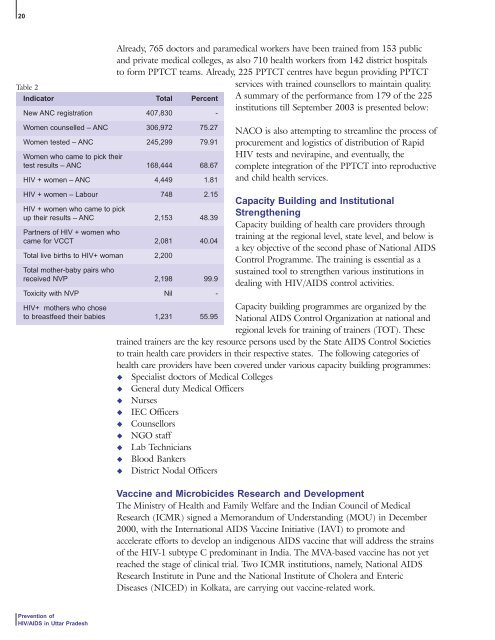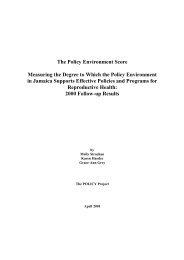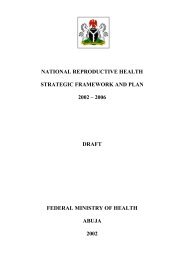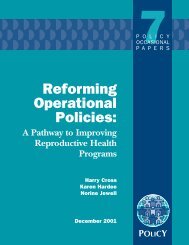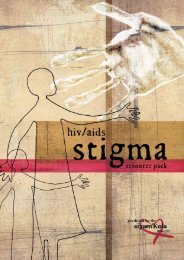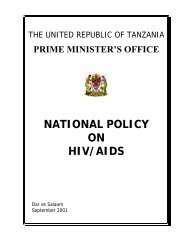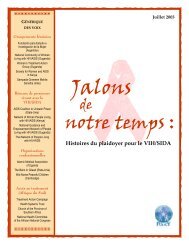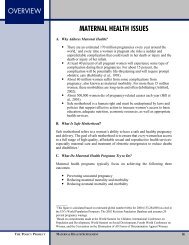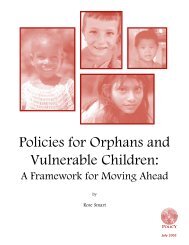Full Document (English) - POLICY Project
Full Document (English) - POLICY Project
Full Document (English) - POLICY Project
You also want an ePaper? Increase the reach of your titles
YUMPU automatically turns print PDFs into web optimized ePapers that Google loves.
20<br />
Already, 765 doctors and paramedical workers have been trained from 153 public<br />
and private medical colleges, as also 710 health workers from 142 district hospitals<br />
to form PPTCT teams. Already, 225 PPTCT centres have begun providing PPTCT<br />
Table 2<br />
Indicator<br />
New ANC registration<br />
Total<br />
407,830<br />
Percent<br />
-<br />
services with trained counsellors to maintain quality.<br />
A summary of the performance from 179 of the 225<br />
institutions till September 2003 is presented below:<br />
Women counselled – ANC 306,972 75.27<br />
Women tested – ANC 245,299 79.91<br />
Women who came to pick their<br />
test results – ANC 168,444 68.67<br />
HIV + women – ANC 4,449 1.81<br />
NACO is also attempting to streamline the process of<br />
procurement and logistics of distribution of Rapid<br />
HIV tests and nevirapine, and eventually, the<br />
complete integration of the PPTCT into reproductive<br />
and child health services.<br />
HIV + women – Labour 748 2.15<br />
HIV + women who came to pick<br />
up their results – ANC 2,153 48.39<br />
Partners of HIV + women who<br />
came for VCCT 2,081 40.04<br />
Total live births to HIV+ woman 2,200<br />
Total mother-baby pairs who<br />
received NVP 2,198 99.9<br />
Toxicity with NVP Nil -<br />
HIV+ mothers who chose<br />
to breastfeed their babies 1,231 55.95<br />
Capacity Building and Institutional<br />
Strengthening<br />
Capacity building of health care providers through<br />
training at the regional level, state level, and below is<br />
a key objective of the second phase of National AIDS<br />
Control Programme. The training is essential as a<br />
sustained tool to strengthen various institutions in<br />
dealing with HIV/AIDS control activities.<br />
Capacity building programmes are organized by the<br />
National AIDS Control Organization at national and<br />
regional levels for training of trainers (TOT). These<br />
trained trainers are the key resource persons used by the State AIDS Control Societies<br />
to train health care providers in their respective states. The following categories of<br />
health care providers have been covered under various capacity building programmes:<br />
Specialist doctors of Medical Colleges<br />
General duty Medical Officers<br />
Nurses<br />
IEC Officers<br />
Counsellors<br />
NGO staff<br />
Lab Technicians<br />
Blood Bankers<br />
District Nodal Officers<br />
Vaccine and Microbicides Research and Development<br />
The Ministry of Health and Family Welfare and the Indian Council of Medical<br />
Research (ICMR) signed a Memorandum of Understanding (MOU) in December<br />
2000, with the International AIDS Vaccine Initiative (IAVI) to promote and<br />
accelerate efforts to develop an indigenous AIDS vaccine that will address the strains<br />
of the HIV-1 subtype C predominant in India. The MVA-based vaccine has not yet<br />
reached the stage of clinical trial. Two ICMR institutions, namely, National AIDS<br />
Research Institute in Pune and the National Institute of Cholera and Enteric<br />
Diseases (NICED) in Kolkata, are carrying out vaccine-related work.<br />
Prevention of<br />
HIV/AIDS in Uttar Pradesh


